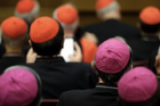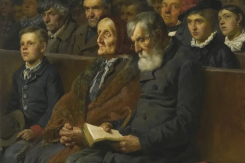Rome: further summaries from Synod of Bishops
The Fifth General Congregation of the Twelfth Ordinary General Assembly of the Synod of Bishops took place on Wednesday afternoon in the presence of the Holy Father. The president delegate on duty was Cardinal Odilo Pedro Scherer, archbishop of Sao Paulo, Brazil.
Extracts from some of the speeches are given below:
ARCHBISHOP DONALD WILLIAM WUERL OF WASHINGTON, USA "The Liturgy is both an act of worship and a pedagogue. The three-year cycle of the Lectionary in its presentation of Scripture offers us an extraordinary opportunity to link the twenty century-long experience of that Scripture reflected in the Catechism of the Catholic Church. The two, the Lectionary and the Catechism of the Catholic Church, should be seen in their correlative qualities. The task before is to help our faithful understand that they are part of the Church, a visible community that is also a spiritual communion. The liturgical homily provides the best occasion for our faithful to encounter the living person of Christ from within an authentic ecclesial and communal setting. ... An understanding of the ecclesial context of God's revelation also helps the hearer of the homily reaffirm not only the meaning of the Word but an allegiance and adherence to the body of Christ - the Church".
ARCHBISHOP TOMASH PETA OF MARIA SANTISSIMA IN ASTANA AND PRESIDENT OF THE EPISCOPAL CONFERENCE OF KAZAKHSTAN. "In the 'Instrumentum Laboris' of our Synod, Part I, Chapter III there is a beautiful text dedicated to the Blessed Virgin Mary; 'Mary, Every Believer's Model for Receiving the Word'. ... The 'Instrumentum Laboris' points out the Holy Rosary as well, as a simple and universally applicable form of prayerfully hearing of the Word of God. I am convinced that it is vital for our times, to remind ourselves of and emphasise this form of prayer, because it is Mary's way; she, who understood and was united with the Word of God more than anybody. In our country Kazakhstan, in Central Asia, an uncountable number of Catholics, deported into this region, for decades had no access to priests or churches, to Bibles or the Sacraments (except the baptism of children which they carried out themselves), but they had the Rosary. It is exactly thanks to the prayer of the Holy Rosary that they were able to preserve their faith within them, as well as their understanding of the essential truths of the Catholic faith, their human dignity and the hope for better times".
BISHOP EDUARDO PORFIRIO PATINO LEAL OF CORDOBA, MEXICO. "Nowadays it is becoming particularly important to understand the proper relationship between the public Revelation of the Christian creed and private revelation, establishing the pertinence of the latter to genuine faith. ... Paragraph 7 of the 'Instrumentum laboris' points out that current religious experience is frequently 'more emotive than convinced, because of the lack of doctrinal knowledge'. People tend rather to subjectivity and the pleasure of creating for themselves a tailor-made religion. Simple people of good will are drawn to alleged [religious] manifestations. Sometimes, though, they become isolated religious groups within the Catholic Church proposing forms of devotion and spirituality the origins of which are to be found in 'private messages and revelations' which must be carefully evaluated and which must, in any case, serve to stimulate integral public Revelation within the living Tradition of the Church. What we suggest, therefore, is reaffirming the doctrine of 'Dei Verbum' 4 and the Catechism of the Catholic Church 66-67, as well as repeating the recommendation to pastors that they channel these religious experiences properly, using criteria that take into account the environment of mobility and globalisation in which we live".
CARDINAL ZENON GROCHOLEWSKI, PREFECT OF THE CONGREGATION FOR CATHOLIC EDUCATION. "Today there is an ever-growing number of educational institutes especially for lay students and ordained persons, but at the same time religious ignorance seems to be on the increase. Recent research, commissioned by the Catholic Biblical Federation and carried out in ten European countries, demonstrated that there is quite incredible ignorance among believers concerning elementary notions in the Bible, for example: 'Are the Gospels part of the Bible?', 'Did Jesus write any books in the Bible?', 'Which of these two people appears in the Old Testament - Moses or Paul?', etc. Such ignorance offers fertile soil for sects. ... We work hard, but perhaps we are not distributing our teaching efforts rationally. ... We should promote and encourage appropriate courses in the holy sciences which, so as to be more easily accessible to a wider public, do not necessarily offer academic qualifications. ... Importance must be given to the fundamental truths of faith, reconnecting them with the Word of God, because this is what determines our Christian life, our relationship with the Lord and our Christian joy".
BISHOP PETER LIU CHENG-CHUNG OF KAOHSIUNG, TAIWAN. "The question is: how to make the 'kerygma' and the proclamation of God's living word more accessible to the faithful? How can this 'kerygma' - this encounter with God's word - be a real dialogue between Christ Himself and the faithful? The answer is recognition of the presence of the Holy Spirit in this Proclamation of God's living word. It is the Holy Spirit that empowers each baptised Catholic with gifts and charisms that are in turn contributions to the local Church. There is a call for bishops and parish priests to try to be open to these realities in the local community of the faithful. And its in these small group communities on the parish level that the Word proclaimed can become a living entity. Gradually the faithful in these communities can celebrate together the Liturgy of the Hours and community celebrations of the Sacrament of Penance (with individual confessions)".
The Sixth General Congregation of the Twelfth Ordinary General Assembly of the Synod of Bishops began yesterday at 9am. The president delegate on duty was Cardinal William Joseph Levada, prefect of the Congregation for the Doctrine of the Faith. Extracts from some of the speeches are given below:
BISHOP VINCENT RI PYUNG-HO OF JEONJU, KOREA. "I would like to share my personal experience: Since the beginning of my episcopacy in 1990, I have been trying to memorize all the biblical passages of daily Mass and most of the time in my preaching, it is enough for me to let the words of God speak by themselves. Then my people understand very well and they are so happy to hear directly the Word of God and the Word of God itself saves the people. ... So, would it not be vital, first, to incorporate a certain amount of Bible 'byhearting' in the formation program of the future and present priests? And second, to establish a concrete directory for a good biblical preaching for them?"
CARDINAL STANISLAW DZIWISZ, ARCHBISHOP OF KRAKOW, POLAND. "Sometimes it seems that candidates to the priesthood treat the texts of the Sacred Scriptures as an object of study without taking into account their spiritual dimension. For them, the Scripture does not become the Word of their life. The force of the Word, capable of changing man, converting him, is not unleashed by the Scripture. We have to rethink the role of the Word of God in seminary formation and, consequently, in the permanent formation of priests. ...The people of God need priests who are passionate about the Word and service. This is one of the necessary conditions of new evangelization that was so close to the heart of Pope John Paul II".
BISHOP EMMANUEL LAFONT OF CAYENNE, FRENCH GUYANA. "The Catholic Biblical Federation is for bishops a privileged instrument which ensures the Word remains the source and inspiration of all prayer, all evangelization, all homily, all catechesis, of every episcopal document and of every work of charity. I can testify to the fertility of the Word among the small and the humble. I have a degree in Holy Scripture from the Biblical Institute of Rome, but it was the poor who really opened me up to the force of the Word. ... The poor are profoundly receptive to the Word of God, and the Church should always read it with them close at hand. I ask that this Synod demonstrates great confidence in the way the humble people and lay persons in general welcome the Word. My greatest fear is not that they make a mistake when they read the Bible, but that they don't read it, and that we may prevent them, by imposing too many precautions, from becoming lovers of the Word".
CARDINAL POLYCARP PENGO, ARCHBISHOP OF DAR-ES-SALAAM, TANZANIA AND PRESIDENT OF THE SYMPOSIUM OF THE EPISCOPAL CONFERENCES OF AFRICA AND MADAGASCAR (SECAM). "There is an appalling phenomenon covering a great part of the African Continent: namely the exodus of the Catholic faithfu1 who abandon the Church to join Pentecostal sects. One reason for that is the reality of a 'division between exegetical research and theological formulation', that is, the lack of reciproca1 collaboration between the two sciences. The outcome of this situation is the violation of the truth of the Sacred Text as well as spiritua1 confusion. This reality invites biblical and theological scientists to collaborate more closely".
Source: VIS



















